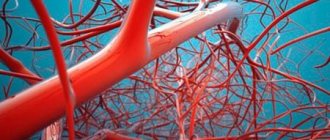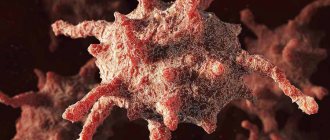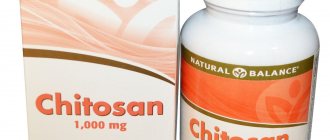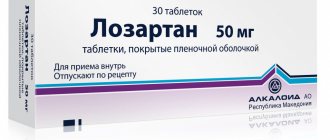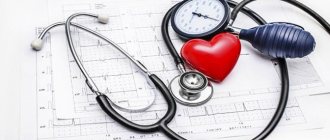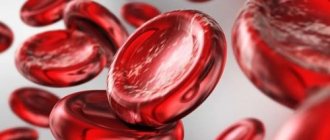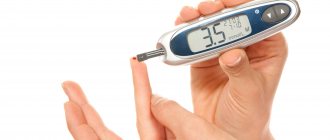Causes and symptoms
The level of creatinine in the blood is interrelated with the volume of muscle tissue and protein intake. The more protein food you have, the more protein you need to remove. If the percentage of muscle content does not change too often with increasing loads or sudden weight loss after dieting, then the creatinine content remains stable.
An increase in levels is called hypercreatininemia. It is manifested by muscle pain, frequent fatigue, swelling and a decrease (rarely an increase) in urine volume. Deviations from the norm cause:
- too frequent and heavy physical activity;
- non-compliance with the drinking regime (drinking liquid in small quantities);
- taking medications for muscle growth;
- depression of liver or kidney function.
In some cases, a “false” increase in level appears, which is not associated with health problems. This happens with excess weight, metabolic disorders, use of nephrotoxin drugs - antibiotics, diuretics, beta blockers, inhibitors, sulfonamides, immunoglobulins, etc.
What is creatinine
This is a product produced as a result of amino acid-protein metabolism. It occurs when muscles contract frequently and actively. A violation of its level will be signaled by such problems with the body as failures in the excretory function of the kidneys, diseases of muscle tissue, and hormonal disruptions.
As for the optimal creatinine level, it will depend on many factors: the person’s age, the food he eats, his physical health, etc.
Creatinine norm - table
Based on age and the content of muscle mass in the body, normal indicators change. The highest values are acceptable for a healthy, active middle-aged man. In women, the numbers are slightly lower, but with the onset of pregnancy they decrease by 30-40%. After 40 years, the norm gradually decreases; with age, muscles become smaller, activity gradually decreases along with creatinine levels.
Table of creatinine content in blood (normal):
| Age and gender | Normal values (mmol/l.) |
| Infants (up to 30 days) | 12-48 |
| Children under 12 months | 20-55 |
| Teenagers under 15 years old | 25-88 |
| Men | 55-106 |
| Women | 43-97 |
| Pregnant women | 35-80 |
The numbers may be different; in order to accurately understand your condition, it is better to calculate the optimal level with your doctor, taking into account your weight, age and previous diseases. In people who are overweight and without one kidney, the indicators will be higher, but all this is discussed at the appointment and taken into account when diagnosing.
Normal level of creatinine in human blood: table by age
The product level is measured in µmol/l, and its norm is:
| Age | Norm |
| Up to 7 years | 45-105 |
| From 7 to 20 years | 27-62 |
| Adult men | 74-110 |
| Adult women | 44-80 |
If these standards are higher, there is a serious danger to the health of the body. Firstly, this is a signal that the excretory function of the kidneys is severely impaired. Secondly, various toxic substances began to accumulate in the blood. If nothing is done as soon as possible, there is a risk that the problem will affect liver function.
Important!
Situations that are much more serious are often observed, in which acute cardiovascular and renal failure develops, advanced problems in the gastrointestinal tract, as well as problems in the form of skin diseases, and serious disorders of the nervous system. If you do not resort to emergency measures, everything can end in death.
How to reduce creatinine in the blood with folk remedies
It is not at all necessary to immediately start taking pills; often traditional methods and a balanced diet will significantly improve the situation and help avoid complications during treatment. There are no harmless drugs; any intervention in the body with the help of chemicals can improve some indicators and worsen others. Even if it is no longer possible to do without medical intervention, herbal teas, leaves, and berries will help normalize a stable condition.
nettle leaves
In addition to the diuretic effect, nettle also has a general strengthening effect, and also has a laxative and expectorant effect. The decoction can be made only from nettle leaves, or you can also add calendula flowers and knotweed. For brewing, take all components in equal proportions and pour in 2 tbsp. mixture with one glass of boiling water. It’s good to do this in a thermos, then strain the infusion before drinking. It is enough to consume 0.5 glasses a day, drinking in small sips throughout the day.
Sage
Collection with sage and burdock roots, dandelion leaves and birch bark due to the content of lithospermate B in it helps the kidneys remove creatinine faster. For 1 cup of boiling water take 3 tbsp. l. All ingredients, mixed in equal parts, prepare a decoction, which is consumed after filtering. It is enough to drink 3 tbsp at night. l.
Lingonberry (leaves)
It is better to brew them for 30 minutes in a water bath. For one day it will be enough to pour 250 grams. boiling water 60 gr. leaves. After preparation, you need to give it time to cool and then drink 1/3 cup 3 times a day. In addition to lingonberries, they also add chamomile flowers, violet, motherwort, string, and dandelion. Mix everything in equal parts, drink no more than 200 grams. per day, divided into 3 parts.
Rose hip
They use both berries and leaves, add hawthorn leaves, dill seeds, bay leaves, and parsley root. To prepare, take 2 dessert spoons and pour 200 ml. boiling water The tea must be infused for at least 3 hours, it is better to leave it overnight, take 5 tbsp the next day. l. 7 times a day. Tea made from pomegranate peels and rose hips, mixed equally, also enhances the secretion of urine. To get the daily norm - 0.5 liters. water is poured into a thermos and left for about 30 minutes, consumed in small portions. Such decoctions also help maintain vitamin C levels.
Dandelion roots
Violet flowers, celandine, St. John's wort are also added to them, and 1 tbsp is mixed. l., boil in 0.5 l. water and leave for about 1 hour, wrapping it up to keep warm. After preparation, filter and drink three times a day 30 minutes before meals. To obtain results, you must continue taking it for at least 30 days.
Chamomile and mint
Chamomile flowers and mint are prepared in a steam bath, left for 40 minutes, and filtered. For daily intake, use 2 tsp. both components per 1 glass of cool water. Take 0.5 cups in the morning and evening.
Oak bark
There are several recipes that normalize creatinine levels. In the first case, take oak bark and bearberry in equal quantities (about 2 tablespoons of the mixture), pour 200 ml. water, bring to a boil over low heat, filter, divide the intake into several approaches, drinking 6 tbsp each time. l.
In the second option, in addition to oak, birch bark and buds are also added. Mix in equal proportions, separate 4 tbsp. l. and pour 1 liter. water. All this must be kept on low heat for at least 60 minutes, after which it is infused, cooled and filtered. Drink 0.5 cups up to 6 times a day.
Creatinine leaves along with urine, so the balance of water in the body must be constantly maintained. You should drink at least 1.5 liters of water, usually 30 ml. for every kilogram of weight. In this case, only pure water is considered without adding salt, sugar, heat treatment and other spices.
Contraindications
Herbal remedies are sometimes not so harmless, especially if taken regularly. Before introducing them into your diet, you need to learn about the characteristics of each component and monitor negative reactions as you consume them. Women need to be very careful when using sage; its use is dangerous for pregnant women (in any trimester it threatens the fetus), during breastfeeding, and with oncology of the uterus and breasts. It is also better for those with hypertension to refrain from using it, as their blood pressure may increase. Also, people with acute kidney inflammation are advised to choose other remedies. If in any doubt, it is better to refrain from untested methods and be sure to consult a specialist.
Preparing for the study
No special preparation is required for the study.
It is necessary to follow the general requirements for preparation for research. GENERAL RULES: 1. For most studies, it is recommended to donate blood in the morning, between 8 and 11 o’clock, on an empty stomach (at least 8 hours must pass between the last meal and blood collection, you can drink water as usual), the day before the test, light dinner with limited intake of fatty foods. For tests for infections and emergency studies, it is acceptable to donate blood 4-6 hours after the last meal.
2. ATTENTION! Special preparation rules for a number of tests: strictly on an empty stomach, after a 12-14 hour fast, you should donate blood for gastrin-17, lipid profile (total cholesterol, HDL cholesterol, LDL cholesterol, VLDL cholesterol, triglycerides, lipoprotein (a), apolipo-protene A1, apolipoprotein B); The glucose tolerance test is performed in the morning on an empty stomach after 12-16 hours of fasting.
3. On the eve of the study (within 24 hours), avoid alcohol, intense physical activity, and taking medications (in consultation with your doctor).
4. 1-2 hours before donating blood, refrain from smoking, do not drink juice, tea, coffee, you can drink still water. Avoid physical stress (running, quickly climbing stairs), emotional excitement. It is recommended to rest and calm down 15 minutes before donating blood.
5. You should not donate blood for laboratory testing immediately after physiotherapeutic procedures, instrumental examination, X-ray and ultrasound examinations, massage and other medical procedures.
6. When monitoring laboratory parameters over time, it is recommended to conduct repeated tests under the same conditions - in the same laboratory, donate blood at the same time of day, etc.
7. Blood for research must be donated before starting to take medications or no earlier than 10–14 days after they are discontinued. To assess the control of the effectiveness of treatment with any drugs, a study should be conducted 7-14 days after the last dose of the drug.
If you are taking medications, be sure to notify your doctor.
How to reduce creatinine with drugs
Reduced levels can be achieved with the help of medications. You should not prescribe medications yourself without supervision from a physician; any self-medication can result in serious consequences. Some tablets may, on the contrary, increase the creatinine content, so you should take this into account and carefully read the composition. For example, vanadium, ibuprofen, ACE inhibitors and cyclosporine provoke exacerbation when taken uncontrolled. Most often, doctors prescribe:
- Ketosteril (according to a doctor’s prescription, 2-8 tablets per day, 3 times a day with meals);
- Supplements with alpha-lipoic acid cleanse the blood of toxins and help maintain creatinine levels within normal limits (up to 300 mg per day);
- Chitosan - in addition to weight loss, it filters the blood (the dose is selected individually and ranges from 1 to 4 g per day);
- Lespeflan - only according to the regimen that is selected by the doctor, specifically taking into account your state of health.
What to do to prevent creatinine from increasing
If research has revealed violations, then in addition to using tablets and decoctions, you should think about your lifestyle and diet. Most often, the appearance of such deviations indicates serious problems with the kidneys, so temporary measures will not be enough. Fluid control, moderate physical activity, diet correction - it’s best to make all this part of your daily routine and stick to it regularly. You can also add massage sessions, cold laser physiotherapy, warm baths or osmotherapy.
How to eat
A very effective method is to eat less foods containing animal protein. Such products force the kidneys to work harder, which negatively affects the amount of substances excreted. It is better not to eat vegetables and fruits high in potassium so that it does not accumulate in the body. Food containing phosphorus is difficult for weakened kidneys to process, so it is better to find out in advance where it is contained and reduce the amount of such products.
Athletes and those who regularly use nutritional supplements should review the composition of the medications they take and exclude those that contain vanadium and creatine.
| Product | Add to food | Reduce consumption | Exclude |
| Plant foods (berries, parsley, cauliflower) | + | ||
| Animal protein (red meat, dairy products) | + | ||
| Anything with a lot of phosphorus (pumpkin, zucchini, cheeses, fish, soybeans) | + | ||
| Anything with a lot of potassium (dried fruits, banana, spinach, potatoes) | + | ||
| Salt, sugar, chicken eggs | + | ||
| Pickles, preserves, ketchup, store-bought sauces | + | ||
| Coffee, strong tea | + | ||
| Sports nutrition containing creatine | + |
Some processed foods contain a lot of salt and additives that strain the kidneys. In order not to be at risk, you must carefully read the ingredients on the packages, summing up the amount you eat per day. Most buyers don’t even know what chips, crackers, sauces, and canned vegetables are made of.
Rice for breakfast
If you cook rice for breakfast for a month and eat it without salt and oil, then your creatinine level will gradually normalize. For the best effect, it is soaked overnight in cold water to swell, and only then boiled for breakfast. For a serving take 6 tbsp. spoons and pour water so that it covers it by two fingers.
Daily regime
To reduce critical indicators and reduce the load on the kidneys, it is better to review your daily routine and stick to it regularly. First of all, it is necessary to maintain water balance and drink clean water in the required quantities throughout the day. Choose the level of physical activity so that it is not too high, but allows you to maintain muscle tone. You may have to replace exhausting running and dumbbells with yoga and walking. It is very important to get enough sleep at night; this will require at least 8-9 hours. Walks in parks and forests should also be included in your daily routine if until now you have devoted little time to this. Increased levels of stress and emotional distress provoke deviations from the norm; to correct this, you should constantly devote time to relaxing and reviewing your reactions to life events.
How to eat healthy when you have high creatinine
If you decide to normalize the creatinine level in the blood at home without the help of doctors and nutritionists, you should know about a very important point - a properly selected diet. Its “base” is as follows:
- reducing the consumption of foods with protein content;
- abstaining from foods with salt and potassium.
Main!
If you want to lower your creatinine levels, then you should stop eating foods high in protein. Thus, these include all products of animal origin - they have the greatest effect on the production of creatinine. And if its level is already quite high, then there is a risk of even more harm to your body, which is not working properly. But you don’t have to completely forget about protein foods - you should include plant-based foods in your diet.
When there are illnesses affecting the functioning of the kidneys, it is worth reducing the intake of foods rich in potassium, because it is this microelement that tends to accumulate in the body. As a result, kidney function, which is responsible for removing potassium from the body, will be impaired and creatinine will increase.
Foods high in salt can cause fluid to accumulate in the body and increase pressure inside the blood vessels. Together, this will trigger an increase in creatinine levels. You need to choose low-salt dishes that will not cause even more harm to the body. So, the maximum daily dose of this substance should be no more than 4-5 grams. Anyone who is used to eating smoked, spicy, salty dishes will have to readjust.
An athlete needs to choose dietary supplements as carefully as possible, paying attention to their composition. After all, many of them contain creatinine - they should be completely excluded from the diet.
It is strictly forbidden to eat such dishes as:
- animal and poultry meat with high fat content;
- high fat fish;
- products made from yeast dough;
- smoked, fried, spicy dishes;
- various spices, salt and sugar.
You can eat, but in limited quantities:
- low fat meat. Moreover, you can eat it only in small portions and no more than twice a week;
- eggs. Maximum – 4-5 pieces for 7 days;
- fish.
Important!
Fish can only be eaten if it has been steamed, stewed or baked. But the varieties must be exclusively dietary.
What is recommended to use:
- any type of fresh fruit;
- boiled vegetables;
- various natural fruit drinks;
- compotes from berries and dried fruits;
- yoghurts, kefir, fermented baked milk, cottage cheese, cheese;
- butter, vegetable oil;
- boiled or steamed rice;
- porridges from various cereals;
- pasta products;
- black bread with flour base;
- filtered mineral water;
- honey;
- dishes cooked in a steamer;
- boiled or stewed dishes;
- casseroles;
- salads;
- cream soups;
- meatballs;
- jelly.

